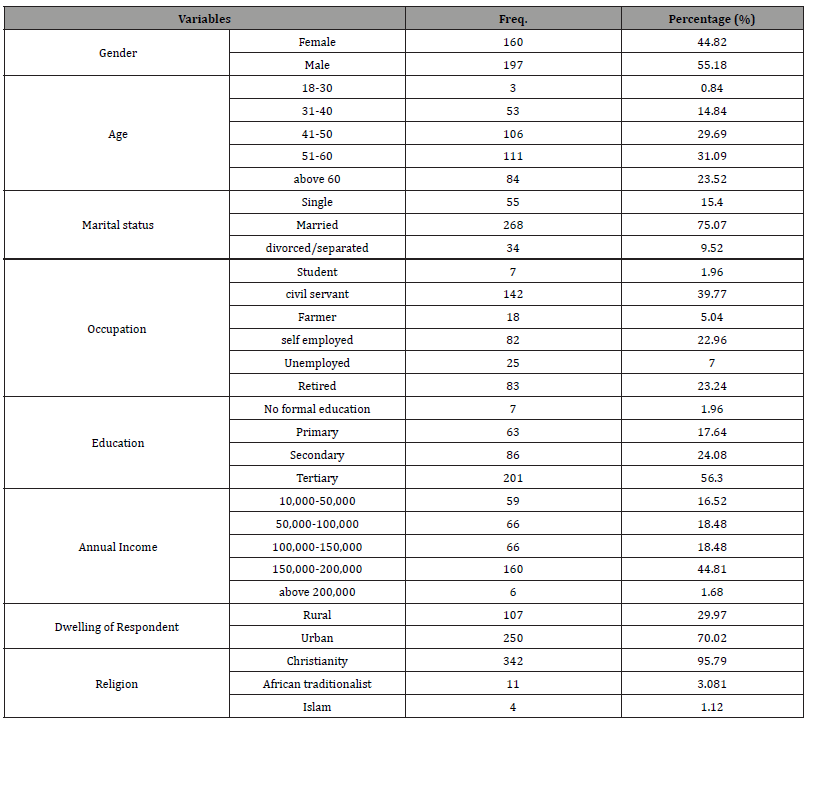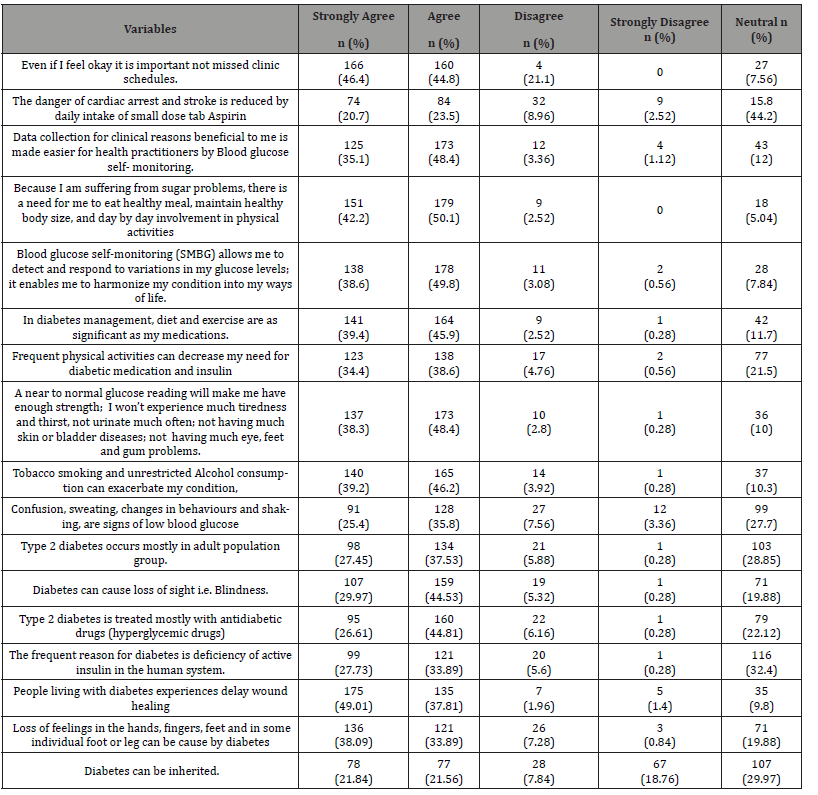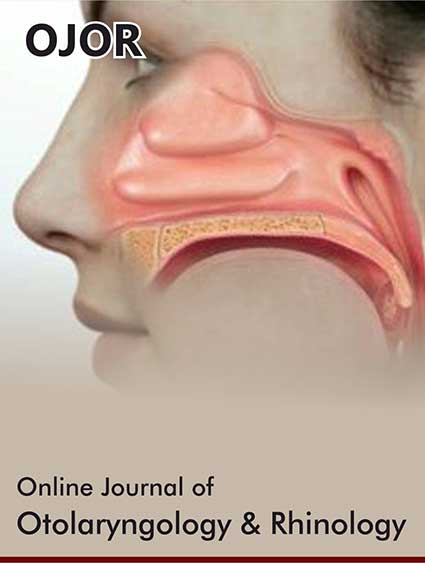 Research Article
Research Article
Assessment of Knowledge of Diabetes and Self-Care Practices Among Type-2 Diabetes Mellitus Patients in Selected Health Care Facilities in Bayelsa State
Ndagi Joshua D, Owonaro Peter A*, Timipre Okeroghene A, Eniojukan Joshua F and Ibegi Ibegi S
Department of Clinical Pharmacy and Pharmacy Practice, Niger Delta University Wilberforce Island, Bayelsa State, Nigeria
Owonaro Peter A, Department of Clinical Pharmacy and Pharmacy Practice, Niger Delta University Wilberforce Island, Bayelsa State, Nigeria.
Received Date:April 04, 2025; Published Date:April 17, 2025
Abstract
Background: Diabetes mellitus, a chronic disease, which was more prevalent in the developed countries, is now on the increase in developing countries.
Objectives: This study aimed to assess how knowledgeable people with type-2 diabetes are about diabetes and diabetes self-care practices.
Methods: A descriptive cross-sectional survey was carried out with 357 respondents using a purposive sampling technique from FMCY, NDUTH
Okolobiri, and Everly Medical Centre with the use of a questionnaire. SPSS version 22, GraphPad pad, and Microsoft Excel 2016 were used for the
analysis of the data.
Results: Over 59% of respondents were aware of the risk factors of diabetes, and over 60% could correctly state the causes of diabetes. Over
80% agreed that diet and exercise are just as important as medications in managing diabetes, and over 80% of the respondents were knowledgeable
about the dangers of smoking and alcohol consumption in DM.
Conclusion: This study revealed that type-2 diabetic patients in Bayelsa State had an appreciable level of knowledge about diabetes.
Recommendations: Health-care practitioners should collaborate to create and increase self-care practice awareness among the patients.
Keywords: Diabetes; Self-care; Bayelsa
Introduction
Diabetes mellitus (DM) is a persistent illness that affect both youths and elderly individuals around the world. The International diabetes federation (IDF) assesses that 463 million individuals have diabetes on the planet. The American Diabetes Association shows that there were about 20.8 million individuals living with diabetes in the United States alone, while as of now, sub-Saharan Africa is assessed to have 20 million individuals living with diabetes [1].
Healthy way of life with sound dieting, i.e. low-fat intake especially saturated fat, low intake of sugar and sugary food, low salt, no alcohol and greater number of fruits and vegetables, physical activities, regular exercise has been proven to help regulate blood glucose levels, lessen cardiovascular danger factors, help to lose weight and feel better. The entirety of the abovementioned if conformed to, are compelling in forestalling/defer diabetic illness [2].
Patients who have satisfactory information on diabetes and its self-management and who are adherent to therapy have better outcomes, live longer, have a higher quality of life, and have fewer symptoms and fewer consequences.
Local pieces of evidence on knowledge of type-2 diabetes and its care-practices are limited in Bayelsa state. Differences in lifestyle and cultural practices will make it impossible to use studies conducted elsewhere to judge the diabetes patients in the study area. The goal of the study is to assess how knowledgeable people with type-2 diabetes are about diabetes and diabetes selfcare practices.
Methodology
Area of study
Two tertiary hospitals; Federal Medical Center Yenagoa (FMCY) and Niger Delta University Teaching Hospital (NDUTH), and a primary health facility; Everly Medical Centre were selected for this study.
Sample size
The sample size was determined with the Taro Yamen’s formula:
n= N/1+N(e)2 where:
n = Sample size required
N = Number of people in the population
e = Margin of error (%) (0.05)
For FMC, N=490, n=220 using, n= N/1+N(e)2 = 223
For NDUTH, N=156, n=112, n= N/1+N(e)2 = 118
For Everly Medical Centre N=16, n=15 N/1+N(e)2 = 16
Total =370
Sampling technique
A purposive sampling technique was used for this study.
Data collection
A well-structured questionnaire adapted from Adibe, et al. (2009) [3] was the research instrument used to collect data.
Pilot-testing
Twenty (20) questionnaires were administered to people living with type-II diabetes (10) in each of these facilities; Dietekoki Memorial Hospital and Gloryland Hospital Yenagoa Bayelsa State to assess clarity of the questionnaires and suitability to the respondents.
Data analysis
Each copy of the questionnaire addressed by the respondent was numbered serially to enhance control and recalling. Data collected was checked for completeness and accuracy.
The data retrieved were screened, collated, scored, and computed. SPSS version 22, GraphPad pad, and Microsoft Excel were used for the analysis of the data.
Ethical approval
Ethical approval was obtained from the ethical committees of each of the health facilities.
Inclusion criteria
Persons living with type II diabetes, attending diabetic clinic at FMCY, NDUTH and Everly Medical Centre, who were at least 20yrs of age were included in this study.
Results
A total of three hundred and seventy (370) questionnaires were distributed, and three hundred and fifty-seven (357) were retrieved and collated, this gave a response rate of 96.5%.
Demographic data of respondents
Table 1:Demography of respondent.

Majority (55.2%) of respondents were male, 60% were aged between 41 - 60 years, 39.7% were civil servants, 56. 3 % had attained a tertiary level education, and 44.8% of respondents had a monthly income of 150,000 to 200,000.
Knowledge of diabetes
Table 2:Knowledge of Diabetes.

This study revealed that over 60% of respondents agreed that diabetes can cause loss of sight, over 70% agreed that diabetes can delay wound healing, and over 80% of the respondents agreed that polyuria, polydipsia, and polyphagia are symptoms of diabetes. This is shown in Table 2 below.
Self-care practices awareness
Over 80% of respondents agreed that it is important to keep scheduled clinic visits even when they feel okay, over 80% agreed that diet and exercise are just as important as medications in managing diabetes, also over 80% of respondents agreed that tobacco smoking and alcohol consumption can exacerbate diabetes.
Discussion
Knowledge of diabetes
This study revealed, on average, a good level of knowledge of diabetes (72.9%) by the respondents. Among the 357 study respondents in this study, over 70% of them had a good knowledge of diabetes, 90% understood what diabetes means, and over 60% could correctly state the cause of diabetes. However, less than half of them were aware that family history is a risk factor of diabetes mellitus, these findings are comparable to the study carried out in Ethiopia by Daniel et al. (2019), using 403 respondents; they observed that 62% had good information, 62.3% were learned about the meaning of DM, 58.3% knew the reasons for DM, and 59.8% were aware of the risk factors of DM, the variation in the scores whereby the current investigation had higher scores in the parameters compared to theirs, might be because of possible distinction in health education, sample size, and accessibility to modern information sources like television, radio, and newspaper.
Education seems to play a vital role here since knowledge increases with higher educational level, and the majority of the respondents (56.3%) had tertiary level education, consequently, a good level of DM awareness and its management routine.
This is in congruence with the study carried out in Onitsha- North Local Government Area, Anambra State, Nigeria, where, as indicated by Uloma, et al. (2014) [4], using 143 government workers in the study, reported that 83% of respondents had good knowledge of DM among the populace. Educational foundation and level of income partly affected the knowledge of the illness.
This current study found that 93.8%, 71.98% and 85.3%, of the respondents had the knowledge of diabetic symptoms, its complications and concur that eating routine and physical activity are as significant as medications in diabetes management respectively. This is in agreement with the investigation by Aljin, et al. (2018) [5], using 258 participants found that, 63.1% of the participants had sufficient knowledge regarding type-II DM, while 91.5%,63.3% and 85% of participants were aware of diabetic symptoms, the complications like retinopathy and neuropathy and that regular exercise can assume a role in monitoring type-2 diabetes mellitus and putting it under control respectively.
Knowledge of diabetes self care
This study revealed that the awareness of diabetes managementroutine among the study participants was good (79.92%) as 85.2% concurred that tobacco smoking and unrestricted alcohol consumption can aggravate their condition and 86.7% were able to identify signs of hyperglycemia as they concurred that “a nearly normal blood glucose level implies more strength; less tiredness and thirst, reduced rate of urinating; reduced rate of skin or bladder diseases; less vision, feet, and gum issues”. The majority of the respondents were metropolitan-based. This observation matches the study by Niguse, et al. (2019) [6, which reported that the respondents had very good information 70.4% and the vast majority of them stay in the municipality. It, therefore, implied that the place of dwelling can have a significant impact on the self-care knowledge of the respondents.
Findings from this study also showed that 88.4% of the participants were aware of the significance of self-monitoring of blood glucose while over 90% knew that it is important to take medicines and keep appointment with care-givers in any event, when they are feeling well and also concurred that diabetes patients should avoid tight foot wears. This is in agreement with the study by Onuoha, et al. (2017) [7], which revealed that 55.1% of participants had moderate level of self-care information concerning blood glucose monitoring, concerning the level of self-care information particular to drug compliance, 66.7% of participants had high level of information, regarding the degree of self-care information explicit to foot care.
This study reported over 80% of the respondents to be knowledgeable about the dangers of smoking and alcohol consumption in DM, and knew about the significance of maintaining the blood sugar at a normal range as they could mention a few signs of normal blood glucose and a little above 60% could identify symptoms of hypoglycaemia. This is in agreement with the study by Jackson, et al. (2014) [8], in two territories of Nigeria, utilizing 303 respondents, the study inferred that the population studied had generally high information about diabetes care-practices as 94.06%, 91.42% and 84.30% had information about the risk of smoking and alcohol, significance of keeping blood glucose at a standard/healthy range and could distinguish manifestation of low blood sugar respectively. The distinction in the scores between Jackson et al. (2014) [8] and this study might be because of contrast in the quality of health education in the different Hospitals as the above study was carried out only in tertiary hospitals while this study was in both primary and tertiary hospitals.
Over 90% of the respondents in this study were aware of the importance of taking cardio-protective medications like low-dose aspirin, to prevent cardiovascular complications and had the knowledge of healthy food choice and maintenance of healthy weight while about 80% knew that chronic elevated blood glucose levels can cause skin, bladder and gum disease just as sight and foot issues. This corroborated the study by Adibe, et al. (2009) [3] in South-East Nigeria. the study used 314 respondents and reported that type-II DM out-patients in South East Nigeria were learned about diabetes care-practices [9-15].
Conclusion
This study revealed that type-2 diabetic patients in Bayelsa state had a good level of knowledge about diabetes and self-care practices. The level of education of the respondents, as well as the place of dwelling, had significant positive effects on their knowledge of diabetes and awareness of diabetes self-management routines.
Recommendations
There is a need to increase diabetes education, especially among the young respondents between the ages of 30-40 years. all hands must be on deck by health-care practitioners to create and increase self-care practice awareness among the patients.
Contribution to Knowledge
Findings from this study showed that level of education influences people’s knowledge of diabetes and self-care practices in Yenagoa.
Public Health Implication
Educational campaigns aimed at improving knowledge of diabetes and self-care practices in Yenagoa targeted at young adults will be of significant impact.
Limitations
This study was carried out in Bayelsa State, Nigeria, thus the findings may not be applicable to the entire country’s population, however the data collection tool used for this study were validated.
Acknowledgement
The researchers appreciate the statistician, respondents, and co-researchers for the time.
Conflict of Interest
The researchers declare that there was no conflict of interest.
References
- Ogurtsova KD, Fernandes JD, Huang Y, Linnenkamp U, Guariguata L, et al. (2017) IDF Diabetes Atlas: Global estimates for the prevalence of diabetes for 2015 and 2040. Diabetes Res Clin Pract 128: 40-50.
- Asmelash D, Abdu N, Tefera S, Baynes HW, Derbew C (2019) Knowledge, Attitude, and Practice towards Glycemic Control and Its Associated Factors among Diabetes Mellitus Patients. J Diabetes Res 8: 2593684.
- Adibe MO, AGUWA CN, Ukwe C, Jegbefume MO (2009) Diabetes self-care knowledge among type-2 Diabetic Out-Patients in South-Eastern Nigeria. International Journal of Drug Development and Research.
- Uloma A, Maurice CA, Dennis OU (2014) Socio-demographic determinants of the knowledge of diabetes mellitus in Onitsha-North Local Government Area, Anambra State, Nigeria. Medicine, Sociology Orient Journal of Medicine.
- Aljin V, Umadevi R, Anantha Eashwar VM (2018) Awareness of Diabetes Among Patients with Type 2 Diabetes Mellitus Attending a Rural Health and Training Center.
- Niguse H, Belay G, Fisseha G, Desale T, Gebremedhn G (2019) Self-care related knowledge, attitude, practice and associated factors among patients with diabetes in Ayder Comprehensive Specialized Hospital, North Ethiopia. BMC Res Notes 12: 34.
- Onuoha P, Vincent R, Boochoon D, Duke V, Ramsingh S, et al. (2017) Knowledge and practice of self-care management of persons with type II diabetes at a health centre in East Trinidad. International Journal of Development Research vol:7.
- Jackson IL, Adibe MO, Okonta MJ, Ukwe CV (2014) Knowledge of self-care among type 2 diabetes patients in two states of Nigeria. Pharm Pract (Granada) 12(3): 404.
- Agofure O, Efegbere AH, Odje AE, (2018) Knowledge of dietary and medical management of type-2 diabetes in urban and rural communities in Delta state Nigeria. African journal of diabetes medicine Vol 26 page 14.
- Alexandre AM, BiliLongyingZha (2018) Knowledge of type 2 diabetes mellitus and adherence to management guidelines: a cross-sectional study in Juba, South Sudan. South Sudan medical journal Vol 11 No 4.
- Oputa RN, Chinenye S, (2015) Diabetes in Nigeria: a translational medicine approach. African journal of diabetes medicine vol 23 page 7.
- Perera DP, De Silva RE, Perera WL (2013) Knowledge of diabetes among type 2 diabetes patients attending a primary health care clinic in Sri Lanka. East Mediterr Health J 19(7): 644-648.
- Razalee S, Saziatul NS (2019) Knowledge of Type 2 Diabetes Mellitus among Adults with and Without Diabetes in Universiti Kebangsaan Malaysia. Pakistan Journal of Nutrition 18: 109-116.
- Sorato MM, Tesfahun C, Lamessa D (2016) Levels and Predictors of Adherence to Self-care Behaviour among Adult Type 2 Diabetics at Arba Minch General Hospital, Southern Ethiopia. J Diabetes Metab 7: 684.
- Uloko AE, Musa BM, Ramalan MA, Gezawa ID, Puepet FH, et al. (2018) Prevalence and Risk Factors for Diabetes Mellitus in Nigeria: A Systematic Review and Meta-Analysis. Diabetes Ther 9(3): 1307-1316.
-
Ndagi Joshua D, Owonaro Peter A*, Timipre Okeroghene A, Eniojukan Joshua F and Ibegi Ibegi S. Assessment of Knowledge of Diabetes and Self-Care Practices Among Type-2 Diabetes Mellitus Patients in Selected Health Care Facilities in Bayelsa State. On J Otolaryngol & Rhinol. 7(4): 2025. OJOR.MS.ID.000667.
-
Type-2 diabetes, Self-care practices, Skin, Gum disease, Smoking, Hypoglycaemia, Tiredness and thirst, Tobacco smoking, Alcohol consumption, Wound healing
-

This work is licensed under a Creative Commons Attribution-NonCommercial 4.0 International License.






